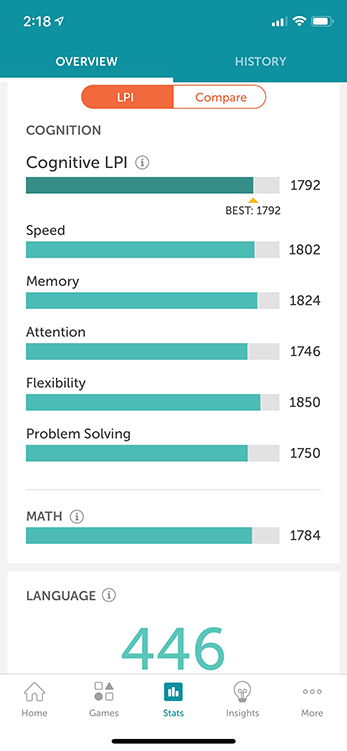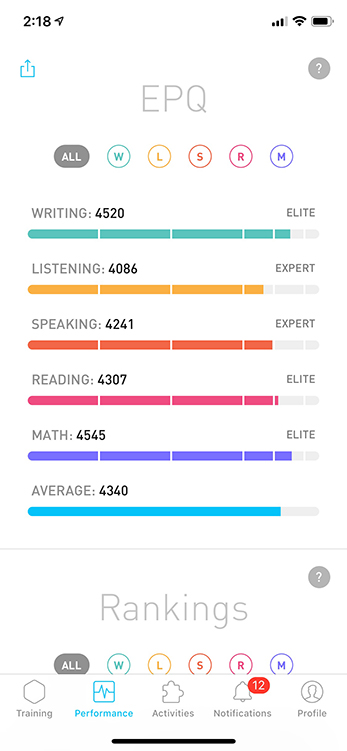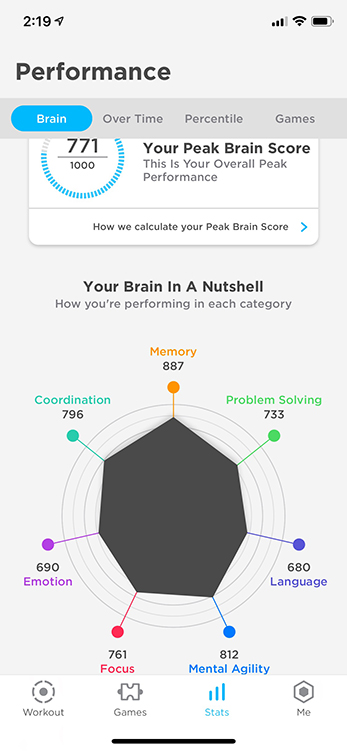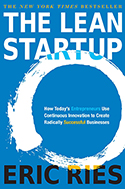Each month I provide an update on my progress to bettering cognitive health. This includes challenging my brain in scored games, expanding my knowledge through books, reviewing the latest research articles and watching creative, idea-worthy talks.
Brain Games
I only missed two days of brain games (Lumosity, Elevate and Peak) within the past 30 days. That means 28 workouts this past month which pushed me to set personal records in all three apps again. My improvements were very similar to what I saw from April to May. The thing I’d say I noticed the most this month is an increase in vocabulary. Each app has various games that train your skills with words and I’ve noticed myself using words in real-life conversations that I learned from the apps. Kinda neat! Hopefully, it translates to better blog posts too…



Brain Workouts: 28 out of 30 days
Lumosity LPI: 1792 (+9 since May)
Elevate Average: 4340 (+55 since May)
Peak Brain Score: 771 (+17 since May)
Book of the Month
I read The Lean Startup by Eric Ries this month. It was the hardest book for me to get through this year. It was pretty dry with examples strictly business related and lacking any humor or fun. Despite that, the book turned out to be quite informational with a lot of lessons I learned and will be applying in my life, this blog, and at work. The book talked a lot about vanity metrics, which are statistics used in business to gauge growth/performance that don’t tell the whole story. For example, number of app downloads may be a statistic used to gauge how well a new mobile app is growing but that metric doesn’t tell you if the app is ever being opened, used, or reused. A better metric could be screen time in the app to measure user engagement. So, the idea is to avoid vanity metrics and use actionable metrics like user engagement or active users. Another thing the booked talked a lot about was A/B testing. A good example of this would be a weekly newsletter that you send out to customers. It recommends creating two different newsletters, sending them each out to half of your user-base and then analyzing the email open rate, link clicks and purchases to determine the better performing newsletter. So, although the book wasn’t entertaining at all, I’m still happy with the information gained from it as it’s very applicable.
Get Outside
A study that caught my eye this month came out of the U.K. in regards to spending time outside. In general, many studies have shown that spending time outside decreases stress, depression, anxiety, blood pressure, and boosts creativity and cognitive health. What this study targeted was the amount of time needed outside to achieve these effects. What the study found was that the benefits of being outside peaked at two hours a week. After spending more than two hours a week outside, the benefits were still there but started to diminish. So, if you’re looking for an easy way to get these great health benefits, try a two hour hike each week. I just got back from a 5 hour hike and can definitely tell the immediate effects of reducing stress. It’s also a great opportunity to be social by spending time with friends and family.
A two-hour dose of nature each week could make you happier and healthier
Sleep is Your Superpower
I posted this TED talk in last month’s cognitive health update. At the time, it had been released on TED’s website but not on YouTube. Since my last post, it’s since been uploaded to YouTube and has received over 2 million views. If you haven’t watched this video yet on the importance of sleep and cognitive health, here’s another chance:
Final Thoughts
Another good month of brain exercises that showed up in the app scores/results. Another good month of reading with a book that’s taught me important business lessons. And, another good month reviewing studies to learn the amount of time needed to reap the cognitive rewards of being outside.
Another good month. Let’s keep it going.
If you liked this post, please subscribe to the weekly newsletter and follow the social media accounts for the latest content!
Disclosure: I frequently review or recommend products and services that I own and use. If you buy these products or services using the links on this site, I receive a small referral commission. This doesn’t impact my review or recommendation.

